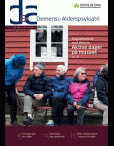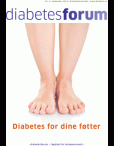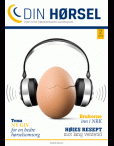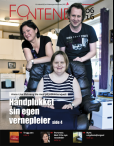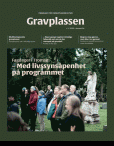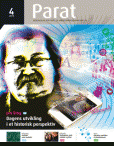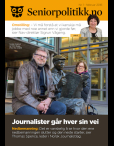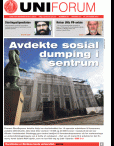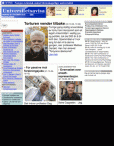Fysioterapeuten
26.08.2016

Mental disorders impose an enormous disease burden on societies throughout the world. More than 450 million people across the globe suffer from mental illness (1).
In a survey done in Australia by National Survey of Mental Health and Wellbeing of Adults in 2007, 1 in 5 adults were reported to have had mental disorders within 12 months of the survey being undertaken (2).
Mental disorders comprise a broad range of problems. They are generally characterized by a combination of abnormal thoughts, emotions, behavior and relationships with others. Some examples: schizophrenia, depression, intellectual disabilities and disorders due to drug abuse (1). People with mental illness, like depression, schizophrenia and bipolar disorder, often have poor physical health and experience significant psychiatric, social and cognitive disability. Good mental health is fundamental to the well-being of individuals, families and communities (2). Poor mental health is identified as one of the biggest causes of disability, poor quality of life and reduced productivity. There is also a strong association between mental health conditions and people reporting multiple pain sites (2).
It has also been documented that physical activity can improve quality of life for people with serious mental illness. Improved physical health can alleviate psychiatric and social disability (3). A notable number of longitudinal and cross-sectional studies have proven the usefulness of physical activity as a preventative strategy and as adjunct treatment for mental illness. Several physiotherapy interventions are potentially effective in improving physical and mental health and health related quality of life. The most commonly used forms of exercise are aerobic-and strength exercises (4). Aerobic exercises, such as walking, jogging, cycling, swimming, have been proven to reduce anxiety and depression (5).
Health factors affected by exercise Mood: Exercises improve mood by increasing blood circulation to the brain. It can also influence the hypothalamic pituitary adrenal axis, and thus influence the physiological reaction to stress. In addition to this, exercises can counteract negative mood by improving self-esteem and cognitive function (5).
Sleep pattern: Moderate exercise may present a non-pharmacological treatment alternative for sleep and metabolic disorders (6).
Cognitive function: One of the possible mechanisms by which physical activity improves cognition in older people at increased risk of dementia is an alteration in cerebral vascular functioning and brain perfusion (7). Cassilhas et al. observed that resistance training for elderly people resulted in improvement of cognitive function and mood. This was due to improved blood flow facilitating transportation of nutrients and oxygen to critical CNS structures related to learning, thus improving cognitive function (8).
Self esteem: Exercise alleviate symptoms such as low self esteem and social withdrawal (9). A 20 week exercise program was found to improve self-esteem at all levels of global esteem, physical self-worth and perception of physical condition (10). People engaged in physical exercise are likely to have fewer stress symptoms and more psychological wellbeing than those who do not (11).
Gå til medietMental disorders comprise a broad range of problems. They are generally characterized by a combination of abnormal thoughts, emotions, behavior and relationships with others. Some examples: schizophrenia, depression, intellectual disabilities and disorders due to drug abuse (1). People with mental illness, like depression, schizophrenia and bipolar disorder, often have poor physical health and experience significant psychiatric, social and cognitive disability. Good mental health is fundamental to the well-being of individuals, families and communities (2). Poor mental health is identified as one of the biggest causes of disability, poor quality of life and reduced productivity. There is also a strong association between mental health conditions and people reporting multiple pain sites (2).
It has also been documented that physical activity can improve quality of life for people with serious mental illness. Improved physical health can alleviate psychiatric and social disability (3). A notable number of longitudinal and cross-sectional studies have proven the usefulness of physical activity as a preventative strategy and as adjunct treatment for mental illness. Several physiotherapy interventions are potentially effective in improving physical and mental health and health related quality of life. The most commonly used forms of exercise are aerobic-and strength exercises (4). Aerobic exercises, such as walking, jogging, cycling, swimming, have been proven to reduce anxiety and depression (5).
Health factors affected by exercise Mood: Exercises improve mood by increasing blood circulation to the brain. It can also influence the hypothalamic pituitary adrenal axis, and thus influence the physiological reaction to stress. In addition to this, exercises can counteract negative mood by improving self-esteem and cognitive function (5).
Sleep pattern: Moderate exercise may present a non-pharmacological treatment alternative for sleep and metabolic disorders (6).
Cognitive function: One of the possible mechanisms by which physical activity improves cognition in older people at increased risk of dementia is an alteration in cerebral vascular functioning and brain perfusion (7). Cassilhas et al. observed that resistance training for elderly people resulted in improvement of cognitive function and mood. This was due to improved blood flow facilitating transportation of nutrients and oxygen to critical CNS structures related to learning, thus improving cognitive function (8).
Self esteem: Exercise alleviate symptoms such as low self esteem and social withdrawal (9). A 20 week exercise program was found to improve self-esteem at all levels of global esteem, physical self-worth and perception of physical condition (10). People engaged in physical exercise are likely to have fewer stress symptoms and more psychological wellbeing than those who do not (11).


























